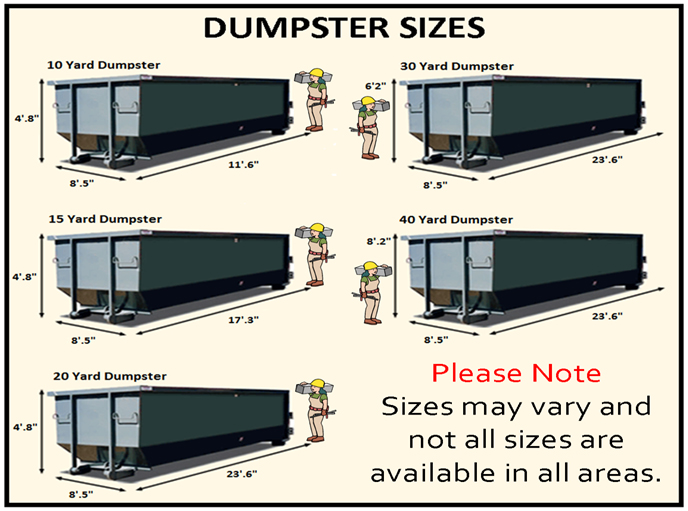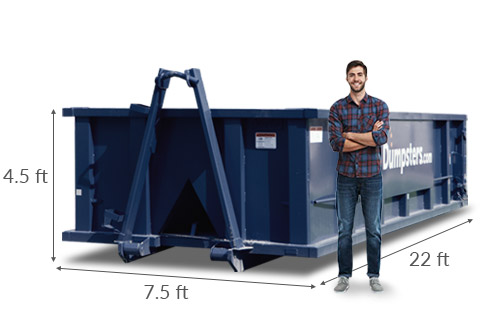When taking into consideration dumpster rental, numerous key factors entered into play to assure reliable, cost-effective, and certified waste disposal. Identifying the right dumpster size, comprehending the kinds of debris that can be gotten rid of, and guaranteeing correct placement and availability are all vital. In addition, rental period and organizing, weight and volume ability limitations, compliance with local regulations, and comparing rental expenses and services are necessary factors to consider. By thoroughly reviewing these factors, you can maximize your waste monitoring procedure, minimize expenses, and avoid prospective pitfalls; now, discover each of these basic considerations in even more information to make an informed decision.
Determining the Right Dumpster Size
When carrying out a task that entails garbage disposal, one essential element to contemplate is the dumpster size The best dumpster dimension warranties efficient waste management, saving time, money, and lessening ecological impact.
A dumpster that is also tiny can bring about frequent emptying, resulting in additional costs and disruptions to the project. On the various other hand, a dumpster that is as well huge can be a waste of sources and space.

To figure out the best dumpster dimension, consider the job's range, kind of products to be dealt with, and the readily available area for the dumpster. A basic guideline is to estimate one cubic yard of dumpster room for every single 3-4 lots of waste.
It is also important to consult local regulations and the dumpster rental firm for specific size needs and limitations. By selecting the appropriate dumpster dimension, you can assure a smooth and environmentally pleasant waste disposal process.
Types of Particles You Can Dispose
The kind of debris you can deal with in a dumpster rental is a crucial consideration to guarantee a smooth waste monitoring process Different dumpsters are designed to take care of particular kinds of waste, and understanding what can and can not be disposed of is vital.
Construction and demolition jobs usually create heavy products like concrete, asphalt, and roofing materials, which need specialized dumpsters.
Household cleanings, on the various other hand, might include dealing with furniture, devices, and basic trash, which can be handled by common dumpsters.
Yard waste, such as tree trimmings and leaves, may additionally be dealt with in designated dumpsters.
However, hazardous materials like batteries, electronics, and chemicals call for special handling and should not be positioned in a basic dumpster.
Additionally, some dumpsters might have certain weight limits or limitations on products like dirt, rocks, and hefty machinery.
Understanding the sorts of debris you can get rid of will ensure you select the right dumpster for your project and stay clear of any potential issues or fines
Dumpster Placement and Accessibility
Proper dumpster positioning and accessibility are vital variables to ponder when renting out a dumpster, as they can significantly influence the efficiency and safety and security of your waste management process
A well-placed dumpster can improve your cleanup efforts, minimize labor costs, and avoid accidents. Alternatively, poor positioning can cause increased costs, lowered productivity, and even injuries.
When determining the suitable placement for your dumpster, consider the complying with vital factors:
- Confirm the dumpster is situated on a level, firm surface to avoid it from moving or tipping over. Choose a location that is conveniently obtainable for both the delivery van and your team, decreasing the risk of damage to surrounding property. Place the dumpster near to the waste generation location to lessen transport distances and labor costs. Avoid placing the dumpster near overhead obstacles, such as power lines or tree branches, to verify safe and efficient loading and unloading
Rental Period and Scheduling
Once the ideal dumpster placement has been identified, focus can move to the logistics of the rental itself. An important facet of this is the rental period, which can vary depending on the job's extent and timeline.
It's crucial to identify the length of time the dumpster will certainly be needed, as this will influence the overall cost of the leasing. Some projects may call for a temporary service, while others might demand a longer period.
When scheduling the rental, it's vital to consider the delivery and pickup dates Validate that the dumpster is supplied at a hassle-free time, allowing for reliable loading and lessening disruptions to the project.
Similarly, schedule the pickup date when the task is complete, or the dumpster is full, to http://piedmonttriaddumpsters.image-perth.org/7-smart-tips-you-need-to-know-for-dumpster-rental avoid additional fees Credible dumpster rental firms will work with you to accommodate your scheduling needs, giving versatility and convenience.
Weight and Volume Capacity Limits
Accommodating diverse task needs, dumpster rental firms offer containers with differing weight and volume ability limits Recognizing these limits is necessary to assure a successful and convenient rental experience
- Weight ability limits differ from 1-10 loads, relying on the dumpster dimension and kind, and are normally determined by the weight of the particles inside the container. Volume capability limitations are usually gauged in cubic backyards and range from 10-40 backyards, with larger containers accommodating even more waste. Choosing the right weight and volume capability limits for your project prevents overloading, decreases the threat of damages to the container or surrounding building, and warranties conformity with safety regulations. Proper planning and estimation of waste quantity and weight likewise help decrease the need for several pickups or extra rental fees, leading to cost savings and an extra efficient project timeline.
Compliance With Local Regulations
Local regulatory conformity is an essential element of dumpster rental, as communities and city governments enforce specific policies and restrictions on waste disposal.

Failure to conform can lead to fines, penalties, and also project delays. It is very important to study and understand the local regulations regulating dumpster leasing in your area, consisting of permits, licenses, and zoning restrictions
Some municipalities have details policies pertaining to dumpster placement, size, and kind. For example, some locations may need dumpsters to be positioned on personal property, while others might permit them to be put on public streets.
Additionally, some cities have laws around the types of materials that can be gotten rid of in dumpsters, such as hazardous waste or construction materials.

To identify compliance, it is crucial to work with a credible dumpster rental firm that recognizes with local regulations.
They can assist you via the process, get necessary authorizations, and warranty that the dumpster is placed and used according to local laws.
Comparing Rental Prices and Services
- What is the total price of the rental, including delivery, pickup, and disposal fees? What dimensions and types of dumpsters are readily available, and which one is ideal for your project? Are there any additional services offered, such as same-day delivery or flexible rental periods? What are the terms of the contract, consisting of the rental period and any penalties for very early termination?